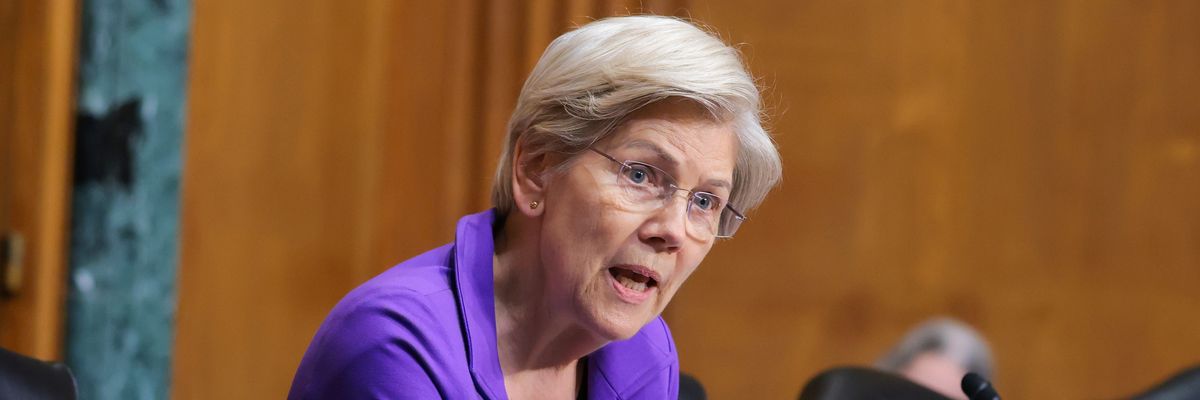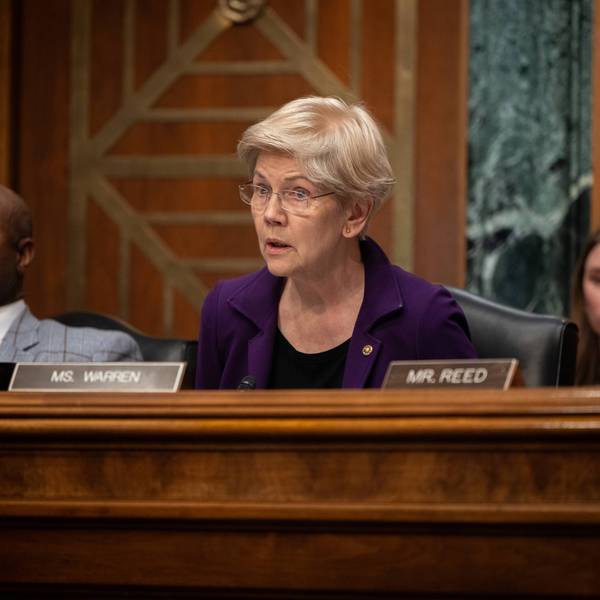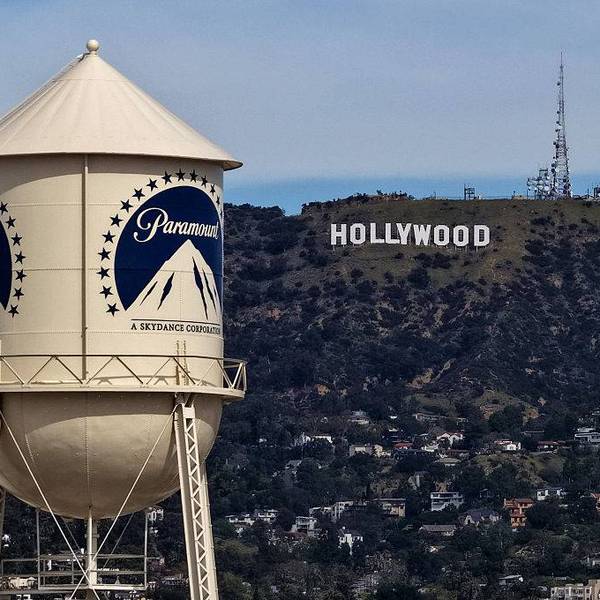
U.S. Sen. Elizabeth Warren (D-Mass.) questions U.S. Trade Representative Jamieson Greer during a Senate Finance Committee hearing on April 8, 2025 in Washington, D.C.
'Time to Break Up This Tech Giant,' Says Warren After Latest Monopoly Ruling Against Google
The ruling pertained to the company's monopolistic hold on advertising technology, and just last year a judge found Google had an illegal monopoly over the internet search and ad markets.
For the second time in less than a year, a federal judge on Thursday ruled that Google has an illegal monopoly in part of its tech business—leading to the latest calls for the Silicon Valley giant to be broken up to end its anticompetitive practices.
U.S. District Judge Leonie Brinkema in the Eastern District of Virginia ruled that Google holds a monopoly over two online advertising markets, after the U.S. Justice Department and several states filed a lawsuit arguing its practices allowing it to dominate advertising technology had enabled the $1.88 trillion company to charge higher prices and take a bigger portion of profits from sales.
"In addition to depriving rivals of the ability to compete, this exclusionary conduct substantially harmed Google's publisher customers, the competitive process, and, ultimately, consumers of information on the open web," said Brinkema in the 115-page decision.
U.S. Sen. Elizabeth Warren (D-Mass.) applauded DOJ lawyers and called the victory "the result of years of work to rein in tech companies' abuses."
Google's latest legal defeat, said the senator, shows that "Google is an illegal monopolist—and it's time to break up this tech giant."
Jonathan Kanter, former assistant attorney general in the DOJ's Antitrust Division, added that the company "is an illegal monopolist twice over."
"The company's near-total dominance of the online advertising market hurts media companies, rival search engines, social media companies, and anyone who consumes media on the internet."
Last August, U.S. District Judge Amit Mehta issued a landmark ruling in another antitrust case against Google, saying the company had illegally monopolized the online search and general text advertising markets.
Next week, Mehta is scheduled to consider whether to break up the company over its control of online searches. The DOJ has also called for a breakup of Google's advertising tech monopoly.
"Case by case, antitrust enforcers are taming the beasts of Big Tech," said Lee Hepner, senior legal counsel at the American Economic Liberties Project. "Yet another monumental win in the history of antitrust enforcement, this case in particular is a win for journalists, publishers, online content creators, and the distributed open web."
In the advertising tech case that was decided Thursday, the government argued last year that Google locked web publishers into using its software, harming websites that produce content that they make available for free online.
The result of Google's practices, said Sacha Haworth, executive director of the Tech Oversight Project, "is that our internet is less open and free, and civic discourse has irreparably been damaged by killing the local news we need to operate a vibrant democracy."
"This ruling is an unequivocal win for the American people that will help lower prices, increase competition, and lead to a better internet for everyone," said Haworth.
Jason Kint, CEO of the nonprofit trade association Digital Content Next, said Thursday's ruling underscores "the global harm caused by Google's practices, which have deprived premium publishers worldwide of critical revenue, undermining their ability to sustain high-quality journalism and entertainment."
"Today's decision," said Kint, "is a significant step toward restoring competition and accountability in the digital advertising ecosystem."
Emily Peterson-Cassin, corporate power director at Demand Progress Education Fund, said that "Google's illegal monopolies are blunting [the United States'] competitive edge in the tech industry" and called on the courts to take far-reaching action against the company.
"Our nation has grown prosperous and powerful because of competition," said Peterson-Cassin. "The company's near-total dominance of the online advertising market hurts media companies, rival search engines, social media companies, and anyone who consumes media on the internet. As one of the richest, most powerful companies in the history of humanity, a mere fine or slap on the wrist won't cut it. For the good of our nation and the health of our tech and media industries the government must force Google to sell its advertising technology division."
An Urgent Message From Our Co-Founder
Dear Common Dreams reader, The U.S. is on a fast track to authoritarianism like nothing I've ever seen. Meanwhile, corporate news outlets are utterly capitulating to Trump, twisting their coverage to avoid drawing his ire while lining up to stuff cash in his pockets. That's why I believe that Common Dreams is doing the best and most consequential reporting that we've ever done. Our small but mighty team is a progressive reporting powerhouse, covering the news every day that the corporate media never will. Our mission has always been simple: To inform. To inspire. And to ignite change for the common good. Now here's the key piece that I want all our readers to understand: None of this would be possible without your financial support. That's not just some fundraising cliche. It's the absolute and literal truth. We don't accept corporate advertising and never will. We don't have a paywall because we don't think people should be blocked from critical news based on their ability to pay. Everything we do is funded by the donations of readers like you. Will you donate now to help power the nonprofit, independent reporting of Common Dreams? Thank you for being a vital member of our community. Together, we can keep independent journalism alive when it’s needed most. - Craig Brown, Co-founder |
For the second time in less than a year, a federal judge on Thursday ruled that Google has an illegal monopoly in part of its tech business—leading to the latest calls for the Silicon Valley giant to be broken up to end its anticompetitive practices.
U.S. District Judge Leonie Brinkema in the Eastern District of Virginia ruled that Google holds a monopoly over two online advertising markets, after the U.S. Justice Department and several states filed a lawsuit arguing its practices allowing it to dominate advertising technology had enabled the $1.88 trillion company to charge higher prices and take a bigger portion of profits from sales.
"In addition to depriving rivals of the ability to compete, this exclusionary conduct substantially harmed Google's publisher customers, the competitive process, and, ultimately, consumers of information on the open web," said Brinkema in the 115-page decision.
U.S. Sen. Elizabeth Warren (D-Mass.) applauded DOJ lawyers and called the victory "the result of years of work to rein in tech companies' abuses."
Google's latest legal defeat, said the senator, shows that "Google is an illegal monopolist—and it's time to break up this tech giant."
Jonathan Kanter, former assistant attorney general in the DOJ's Antitrust Division, added that the company "is an illegal monopolist twice over."
"The company's near-total dominance of the online advertising market hurts media companies, rival search engines, social media companies, and anyone who consumes media on the internet."
Last August, U.S. District Judge Amit Mehta issued a landmark ruling in another antitrust case against Google, saying the company had illegally monopolized the online search and general text advertising markets.
Next week, Mehta is scheduled to consider whether to break up the company over its control of online searches. The DOJ has also called for a breakup of Google's advertising tech monopoly.
"Case by case, antitrust enforcers are taming the beasts of Big Tech," said Lee Hepner, senior legal counsel at the American Economic Liberties Project. "Yet another monumental win in the history of antitrust enforcement, this case in particular is a win for journalists, publishers, online content creators, and the distributed open web."
In the advertising tech case that was decided Thursday, the government argued last year that Google locked web publishers into using its software, harming websites that produce content that they make available for free online.
The result of Google's practices, said Sacha Haworth, executive director of the Tech Oversight Project, "is that our internet is less open and free, and civic discourse has irreparably been damaged by killing the local news we need to operate a vibrant democracy."
"This ruling is an unequivocal win for the American people that will help lower prices, increase competition, and lead to a better internet for everyone," said Haworth.
Jason Kint, CEO of the nonprofit trade association Digital Content Next, said Thursday's ruling underscores "the global harm caused by Google's practices, which have deprived premium publishers worldwide of critical revenue, undermining their ability to sustain high-quality journalism and entertainment."
"Today's decision," said Kint, "is a significant step toward restoring competition and accountability in the digital advertising ecosystem."
Emily Peterson-Cassin, corporate power director at Demand Progress Education Fund, said that "Google's illegal monopolies are blunting [the United States'] competitive edge in the tech industry" and called on the courts to take far-reaching action against the company.
"Our nation has grown prosperous and powerful because of competition," said Peterson-Cassin. "The company's near-total dominance of the online advertising market hurts media companies, rival search engines, social media companies, and anyone who consumes media on the internet. As one of the richest, most powerful companies in the history of humanity, a mere fine or slap on the wrist won't cut it. For the good of our nation and the health of our tech and media industries the government must force Google to sell its advertising technology division."
- Google-California Deal Should Be a Wake-Up Call: Digital Monopolies Hurt Journalism ›
- Opinion | After Two Setbacks For Google’s Monopoly, the Fight To Rein in Its Empire Continues | Common Dreams ›
- Judge's Ruling on Google Search Monopoly Decried as 'Slap on the Wrist' for Tech Giant | Common Dreams ›
For the second time in less than a year, a federal judge on Thursday ruled that Google has an illegal monopoly in part of its tech business—leading to the latest calls for the Silicon Valley giant to be broken up to end its anticompetitive practices.
U.S. District Judge Leonie Brinkema in the Eastern District of Virginia ruled that Google holds a monopoly over two online advertising markets, after the U.S. Justice Department and several states filed a lawsuit arguing its practices allowing it to dominate advertising technology had enabled the $1.88 trillion company to charge higher prices and take a bigger portion of profits from sales.
"In addition to depriving rivals of the ability to compete, this exclusionary conduct substantially harmed Google's publisher customers, the competitive process, and, ultimately, consumers of information on the open web," said Brinkema in the 115-page decision.
U.S. Sen. Elizabeth Warren (D-Mass.) applauded DOJ lawyers and called the victory "the result of years of work to rein in tech companies' abuses."
Google's latest legal defeat, said the senator, shows that "Google is an illegal monopolist—and it's time to break up this tech giant."
Jonathan Kanter, former assistant attorney general in the DOJ's Antitrust Division, added that the company "is an illegal monopolist twice over."
"The company's near-total dominance of the online advertising market hurts media companies, rival search engines, social media companies, and anyone who consumes media on the internet."
Last August, U.S. District Judge Amit Mehta issued a landmark ruling in another antitrust case against Google, saying the company had illegally monopolized the online search and general text advertising markets.
Next week, Mehta is scheduled to consider whether to break up the company over its control of online searches. The DOJ has also called for a breakup of Google's advertising tech monopoly.
"Case by case, antitrust enforcers are taming the beasts of Big Tech," said Lee Hepner, senior legal counsel at the American Economic Liberties Project. "Yet another monumental win in the history of antitrust enforcement, this case in particular is a win for journalists, publishers, online content creators, and the distributed open web."
In the advertising tech case that was decided Thursday, the government argued last year that Google locked web publishers into using its software, harming websites that produce content that they make available for free online.
The result of Google's practices, said Sacha Haworth, executive director of the Tech Oversight Project, "is that our internet is less open and free, and civic discourse has irreparably been damaged by killing the local news we need to operate a vibrant democracy."
"This ruling is an unequivocal win for the American people that will help lower prices, increase competition, and lead to a better internet for everyone," said Haworth.
Jason Kint, CEO of the nonprofit trade association Digital Content Next, said Thursday's ruling underscores "the global harm caused by Google's practices, which have deprived premium publishers worldwide of critical revenue, undermining their ability to sustain high-quality journalism and entertainment."
"Today's decision," said Kint, "is a significant step toward restoring competition and accountability in the digital advertising ecosystem."
Emily Peterson-Cassin, corporate power director at Demand Progress Education Fund, said that "Google's illegal monopolies are blunting [the United States'] competitive edge in the tech industry" and called on the courts to take far-reaching action against the company.
"Our nation has grown prosperous and powerful because of competition," said Peterson-Cassin. "The company's near-total dominance of the online advertising market hurts media companies, rival search engines, social media companies, and anyone who consumes media on the internet. As one of the richest, most powerful companies in the history of humanity, a mere fine or slap on the wrist won't cut it. For the good of our nation and the health of our tech and media industries the government must force Google to sell its advertising technology division."
- Google-California Deal Should Be a Wake-Up Call: Digital Monopolies Hurt Journalism ›
- Opinion | After Two Setbacks For Google’s Monopoly, the Fight To Rein in Its Empire Continues | Common Dreams ›
- Judge's Ruling on Google Search Monopoly Decried as 'Slap on the Wrist' for Tech Giant | Common Dreams ›

